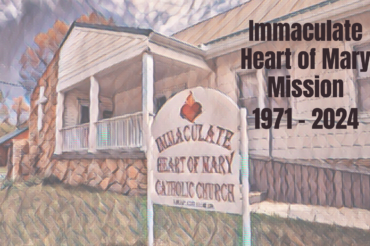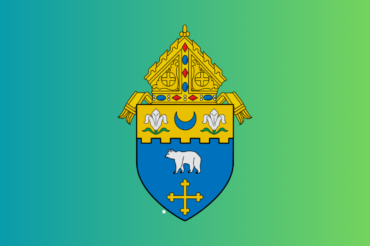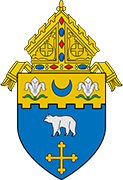What kind of Kingdom is Christ’s?

Marc Cardaronella
We say it every Mass and every time we pray a rosary. We might even say it every night before we go to bed. It’s a line from the Our Father–thy kingdom come…on earth as it is in heaven. I have often wondered what exactly am I asking for here?
This Sunday is the Solemnity of Christ the King. It was instituted in 1925 by Pope Pius XI in response to the growing secularism of societies. This era saw the rise of nationalistic socialism and governments that rejected Christian influence. The Pope saw rightly this would lead to losing touch with God’s agency in the world. His aim was to remind Catholics that nations, governments, and political ideologies will come and go, but the kingdom and kingship of Christ transcends all and remains forever. So, what is this heavenly kingdom and how does it come to earth?
We get an understanding from this Sunday’s gospel (John 18:33b-37), in Jesus’ exchange with Pilate. The passage opens with Pilate asking, “Are you the King of the Jews?” This accusation is the one thing Pilate cannot ignore. It’s a direct threat to Roman rule. Obviously, Pilate thinks Jesus is claiming an earthly kingdom with political power. Pilate is a politician. He wants political influence and the privileges it provides. Most likely this stint in backwater Judea is a ‘pay-your-dues’ assignment that promises cushier posts in the future…if he does well. We can all relate to gaining power through political positioning. Jesus invites Pilate, and us, to consider something new.
Jesus says, “My kingship is not of this world” (John 18:36). The only other time Jesus spoke of the kingdom is when he explained it to Nicodemus in John 3:3, “Truly, truly, I say to you, unless one is born anew, he cannot see the kingdom of God.’’ God’s kingdom is revealed through the new, spiritual life that comes from faith and baptism. Unless you share in the divine communion between the Father and the Son, it’s lost to you. You can’t get it on your own power. It isn’t controlled by you or come from anything you can do.
Pilate is asking a question whose answer he can’t comprehend. He wants to know if Jesus is claiming authority against his rule. Jesus isn’t…and is. Jesus’ rule extends to every time and place, to every government and society, to every individual. It influences every Roman citizen, but not in the way Pilate thinks. It reaches into the heart.
“The kingdom, already present and growing in our midst, engages us at every level of our being and reminds us of the principle of discernment which Pope Paul VI applied to true development: it must be directed to ‘all men and the whole man’” (Pope Francis, Evangelii gaudium, 181).
Pilate hears the word kingdom and jumps to conclusions. “So you are a king?” he says. Jesus answers, “’You say that I am a king’” (John 18:37). Jesus isn’t denying being a king, but he’s not affirming Pilate’s notion of kingship. Pilate doesn’t grasp it. He only operates in the world. Jesus’ kingdom is not from the world. His followers don’t fight to get him back. He conquers through sacrifice. His followers upset the world order by overcoming through love.
“The kingdoms of this world at times are sustained by arrogance, rivalries and oppression; the reign of Christ is a ‘kingdom of justice, love and peace’. For a Christian, speaking of power and strength means referring to the power of the Cross, and the strength of Jesus’ love: a love which remains steadfast and complete, even when faced with rejection, and it is shown as the fulfillment of a life expended in the total surrender of oneself for the benefit of humanity” (Angelus Address of Pope Francis, Solemnity of Christ the King, November 22, 2015).
Finally, Jesus reveals his kingdom, “For this I was born, and for this I have come into the world, to bear witness to the truth.” (John 18:37). Jesus’ kingship and power come from his witness to the truth in love. He conquers through hearts committed to truth. He reigns through believers committed to love. His power changes the world one heart and mind at a time.
“Jesus is the center of creation; and so the attitude demanded of us as true believers is that of recognizing and accepting in our lives the centrality of Jesus Christ, in our thoughts, in our words and in our works” (Homily of Pope Francis, Solemnity of Christ the King, November 24, 2013).
The kingdom is here, present now in every society and every government. It’s the enemy of those who would subjugate and oppress; the bane of those who would cheat the innocent and take advantage of political power. That’s why God’s kingdom is reviled. It challenges to a new way of thinking–to use their power at the service of truth and self-gift, not aggrandized agenda.
Pilate had no use for the kingdom Jesus proposed. It offered no earthly advantage. It wouldn’t subjugate nations, win wars, or expand empires. Yet, it outlasted and even undermined his Empire in the end. Roman government fell just as Rome itself became the world center of Christianity.
The Feast of Christ the King challenges us to think of power in new ways. We’re tempted to place our sole trust in human influence because it seems like the only way to win. We fight the way the world fights and despair when it doesn’t work. Remember, God is in control. Don’t despair. Christ reigns! The kingdom of God comes to earth when we keep Christ at the center of everything they do. God conquers, not through political power, but by Christians who live in truth, act through self-gift, and place their trust in him.
Marc Cardaronella is Director of the Office of Catechesis and Faith Formation.
Click here to view this Sunday’s Readings on the USCCB Website





